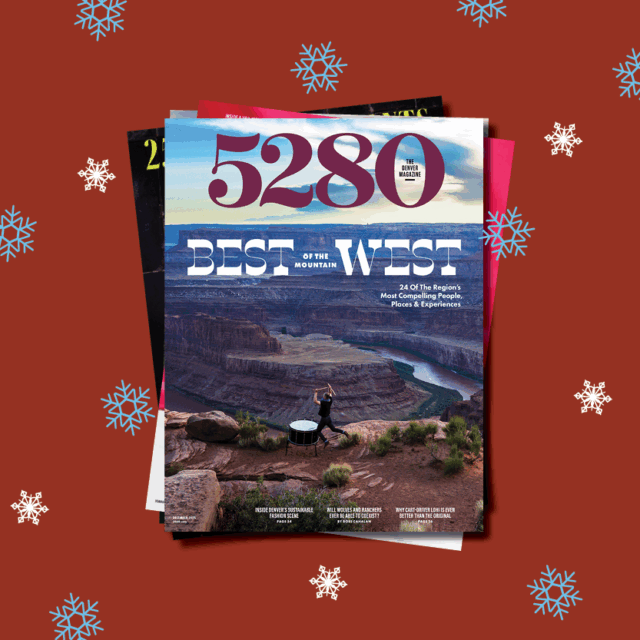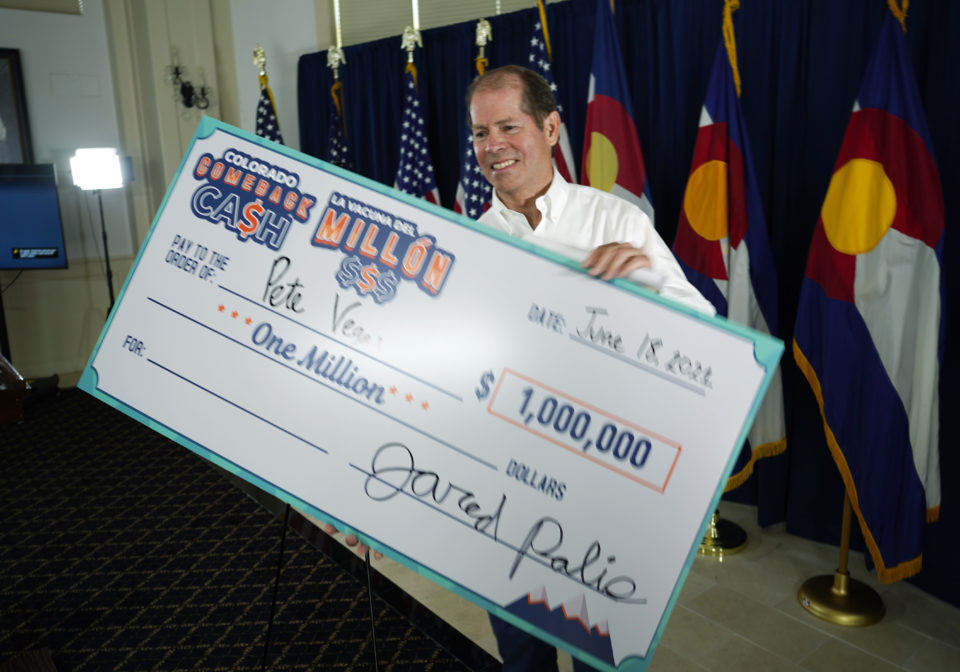The Local newsletter is your free, daily guide to life in Colorado. For locals, by locals.
Last week, Stephanie Sharp thought she was dealing with one more hassle in an already-tough year: a telephone scam. The phone rang incessantly with someone claiming to be from the governor’s office, swearing Stephanie was the fourth million-dollar winner of Colorado Comeback Cash. The state had begun awarding five random vaccinated adults a million dollars from June 4 to July 7—and 25 vaccinated teens $50,000 scholarships—as a way to encourage vaccination.
Friends urged her to ignore the scammer.

Before COVID-19 made Stephanie a millionaire, it made her scared. Wary, even, of her own husband, Craig, an intensive care nurse coming face to face with contagious patients on ventilators. Given her autoimmune disease, Stephanie shied away from hugging Craig and slept in a guest room. “Our whole world spun on its side,” she says. The Douglas County child psychologist even packed a multicolored suitcase with clothes and toiletries she kept as a bug-out bag. If Craig spiked a fever or lost his sense of taste or smell, Stephanie would flee to her aunt’s house in a heartbeat. After a day of “scam” calls, Stephanie decided to humor them. Turns out, she had, in fact, won.
Colorado Comeback Cash is a real thing. Winners this June also included Sally Sliger, a Mead clinical data analyst; Stephanie Ward, a Littleton real estate agent; and Boulder business owner Pete Vegas.
If the virus descended like a plague, this money sloshed into the lives of the winners just as abruptly. Winners were called on Wednesdays and swept into the swanky Governor’s Mansion on Fridays to pick up a giant novelty check, pose with Jared Polis, and answer questions from the press. After telling the cameras about a year full of canceled birthday parties, home-schooling, and relatives who died without proper funerals, so many of the winners looked happy.

“We are still in shock,” Stephanie says. Her winnings won’t go toward a swimming pool or fancy car. She vows to put aside a little for her son’s college tuition, replenish the income she lost being furloughed during the pandemic, and donate some. Best of all, she’s filling that bug-out bag with swimsuits and sunglasses for her 10th wedding anniversary trip to Hawaii. (She and Craig plan to stay in the same room.)
Playing The Numbers
Side effects be damned, when vaccines were first approved, thousands of people scrambled to sign up. Today, the vaccine is free of cost and open to anyone 12 and up. So far, three million Coloradans have received at least one vaccine dose, around 70 percent of adults. Yet, millions of holdouts remain. Some fear potential side effects and others see dark conspiracies in the serum.
Health officials say herd immunity requires vaccination rates of 80 to 90 percent. They say the vaccines are safe: Put the vaccine under a microscope, you’ll see there’s no microchip. While arguments for vaccination are scientific and technical, money is a language everyone speaks. So by spring, health officials were like parents trying to get kids to take their medicine, slathering it with sweeteners.
States from Ohio to California, North Carolina to Washington, and Illinois to Massachusetts opened million-dollar lotteries for the vaxxed. In Colorado, anyone who’s been vaccinated is eligible. (Colorado’s money comes from the federal government’s COVID-19 response money, with winners picked by the Colorado Lottery.) Critics call vaccination lotteries gimmicky, gaudy, silly, questioning whether or not a vaccine lottery would work. None of Colorado’s million-dollar winners got vaccinated as a way to win a million.
Polis doesn’t expect the money to coax die-hard anti-vaxxers. During a conference announcing the fourth winner, he stated that 10 to 20 percent of people plan to get vaccinated, but are putting it off, the way you delay a root canal or oil change. The COVID-19 Lottery may, Polis says, “drive a few more percent to get it now rather than September.”
Is it working? Polis says he can’t be sure until “a grad student crunches the numbers,” but suspects a lottery worked better than, say, spending millions of dollars more in advertisements. The Los Angeles Times analyzed California’s vaccination rates and concluded California’s COVID-19 Lottery “may have reaped some rewards” and “sparked renewed interest in the shots.” “My take on it is that it had some modest effect,” says Dr. George W. Rutherford, an epidemiology professor at the University of California San Francisco who studies COVID lotteries. “It’s never going to be easy to get down to the hardcore unvaccinated, so every little bit helps.”
Paying It Forward
Whether or not the lottery has buoyed vaccination rates, the cash is changing lives for the winners. Stephanie Ward plans to quit one of her two jobs. With college costing more than ever, Clara Smith, 17, of Loveland, was planning on applying to Fort Lewis College in Durango, which she considers an affordable school. But armed with a $50,000 scholarship, she’s looking at art schools, which can cost twice as much, to pursue drawing, painting, and sculpting. Bay Norrish of Nederland, 15, still plans to go to trade school to be an electrician, a path he thinks is cost effective. But with his $50,000, Bay might study archeology just for fun.
Boulderite Pete Vegas won’t pocket his million dollars. (The businessman points out it’s only $600,000 after taxes, anyway.) Vegas wants to save the Earth. His company, Sage V Foods, makes frozen organic rice dishes. He says he’ll pay some of his suppliers to experiment with regenerative agriculture, a type of farming that is a step beyond organic, treating soil as a breathing entity. Vegas’s money could be a cascade of positivity: paying his suppliers to grow cover crops, which nourish the soil and pull carbon out of the air, which mitigates climate change, which, Vegas says, “will allow us to survive as a species.”
And on that note of survival, there’s still time to get vaccinated and qualify to become the final COVID-19 lottery millionaire (or the final five teen scholarship winners). The last drawing is July 7—and there are still big checks to be won.








